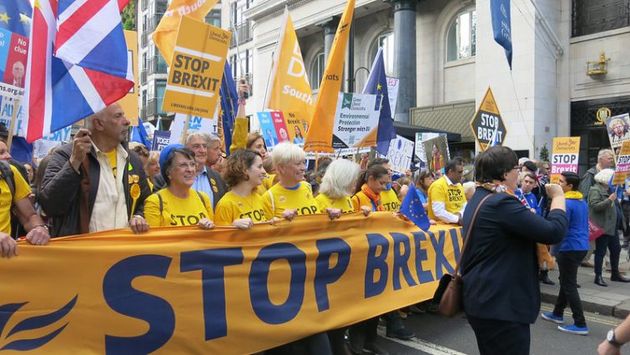Brexit has had a reductionist and therefore dehumanising effect. It encourages us to see people as ‘The Other’.
 Photo: Flickr Peter Curb CC BY 2.0-755x425
Photo: Flickr Peter Curb CC BY 2.0-755x425
When the dust settles, Westminster might look very different but there will be far more that hasn’t changed for the country. As Christians, it’s vital we don’t lose sight of our true priorities – and that we work to prevent matters getting worse in the meantime.
Like it or not, this will be a single-issue election. While one or other political party might try to shift the conversation onto other areas, Brexit will always, unavoidably and understandably dominate the narrative.
This was, after all, an election that was called (outside of the framework of the Fixed-term Parliaments Act) with the intention of giving the Conservative Party a mandate for their vision of Brexit.
But in the end, on 13 December, when we wake up to a new government – or the horse-trading that will precede the formation of a new coalition government, or possibly the prospect of another election to break the ongoing deadlock – the same problems will remain.
Britain is a divided country. The vote to leave the EU was one of the outward manifestations of that. In the UK, Europe and the US, we are seeing an inexorable reality play out in slow motion.
There will always be a minority of the population for whom the political-economic status quo does not work. The task of any reasonable government in a democratic society is to ensure that this minority is as small as possible.
The aspiration for this can be seen in any number of manifesto slogans over the years. ‘The Best Future For Britain’ (Conservatives, 1992). ‘A future fair for all’ (Labour, 2010). ‘Change that works for you’ (Liberal Democrats, 2010).
The last few years have seen the tipping point, when the disenfranchised minority have gradually become the majority. The political classes – who now belong in the new minority – are standing against the economic and demographic tide that has turned against them.
Arguably this is the result of years of even decades of failure by successive governments who kicked the can down the road. Whatever party wins the election, whatever the shape of next government, and whatever the result for Brexit, those divisions will remain for many, many years to come. They won’t disappear overnight on 12 December.
But there is room for things to get much worse in the short term. This already promises to be the nastiest election in living memory. Online and physical threats against MPs have become routine.
Exaggeration, fear-mongering and deliberate misinformation – what we used to call ‘lies’ – are the common currency of campaigning. The stakes are high and there is little room for doubt and therefore nuance; when things are so black and white for those who are most vocal, the effect on the country can only be polarisation.
Political leaders talk about healing the country and moving on; we are a divided nation, but if there is one thing this election promises it is not to unite the country but to divide it further.
This is the true challenge for Christians in run-up to the 2019 General Election. Put Brexit where it belongs: very firmly in second place at best.
Families, friendship groups, neighbourhoods, constituencies and the countries of the United Kingdom have been divided by Brexit and the way it has been presented to us by politicians and in the media.
Conservative, Labour, Lib Dem, SNP; Leave or Remain; none of these will be a magic bullet or will even start to heal the rifts. The evidence of the last 3 years is that viewing the world through such tribal lenses will actually make things worse.
Accepting the line that a party has to fight dirty to win in order to make things better in the long run is like believing a dishonest used car salesman when he says, ‘But this time I’m telling the truth.’ It’s like George Carlin’s famous quote about fighting for peace (to paraphrase: it’s illogically counter-productive).
The process of healing the divisions that exist across the country can only start at the grassroots. We have to prioritise each other as people first, potential voters second.
Brexit – and specifically the way our political and media classes have dealt with it – has had a reductionist and therefore dehumanising effect. It encourages us to see people as ‘The Other’.
History tells us where that leads. The Bible is pretty clear about what we ought to be doing about it.
Guy Brandon is the Senior researcher for the Jubilee Centre.
This blog was first published in the Jubilee Centre website and was republished with permission.

Las opiniones vertidas por nuestros colaboradores se realizan a nivel personal, pudiendo coincidir o no con la postura de la dirección de Protestante Digital.
Si quieres comentar o